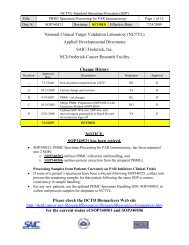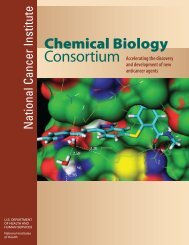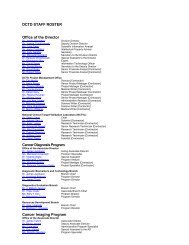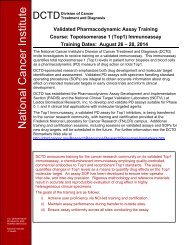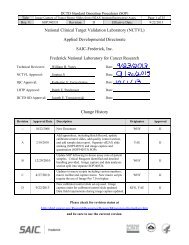National Cancer Institute - NCI Division of Cancer Treatment and ...
National Cancer Institute - NCI Division of Cancer Treatment and ...
National Cancer Institute - NCI Division of Cancer Treatment and ...
You also want an ePaper? Increase the reach of your titles
YUMPU automatically turns print PDFs into web optimized ePapers that Google loves.
Trastuzumab Combined with<br />
Chemotherapy Improves Disease-<br />
Free Survival for Patients with<br />
Early-Stage Breast <strong>Cancer</strong><br />
The combination <strong>of</strong> the targeted agent<br />
trastuzumab (Herceptin®) <strong>and</strong> st<strong>and</strong>ard<br />
chemotherapy cuts the risk <strong>of</strong> Her2positive<br />
breast cancer recurrence by more<br />
than half compared with chemotherapy<br />
alone. The result comes from two large,<br />
CTEP-sponsored, r<strong>and</strong>omized trials testing,<br />
as adjuvant therapy, a trastuzumab/<br />
chemotherapy combination against<br />
chemotherapy alone in women with<br />
invasive, early stage, Her2-positive<br />
breast cancer.<br />
Trastuzumab, manufactured by Genentech,<br />
Inc., specifically targets the HER2<br />
protein, which is overexpressed in<br />
approximately 20 to 30 percent <strong>of</strong> breast<br />
cancers. Her2-positive tumors are not<br />
only more aggressive than tumors that<br />
do not overproduce HER2 protein, but<br />
also they are more likely to recur. Trastuzumab<br />
is approved by FDA for use in<br />
women with Her2-positive metastatic<br />
breast cancer. These are the first trials<br />
to show a benefit for trastuzumab as<br />
breast cancer adjuvant therapy.<br />
Additional analyses will allow the trial<br />
leaders to perform a more thorough risk/<br />
benefit analysis. In the interim analysis,<br />
the likelihood <strong>of</strong> congestive heart failure<br />
(CHF) in women receiving the trastuzumab/chemotherapy<br />
combination was<br />
increased by 3 to 4 percent, compared<br />
with a less than 1 percent CHF rate in<br />
those treated with chemotherapy alone.<br />
S C I E N T I F I C A D V A N C E S<br />
Romond EH, Perez EA, Bryant J, Suman V, Geyer<br />
CE, Davidson N, Tan-Chiu E, Martino S, Swain SM,<br />
Kaufman P, Fehrenbacher L, Pisansky T, Vogel V,<br />
Kutteh LA, Yothers G, Visscher D, Brown AM, Jenkins<br />
R, Seay TE, Mamounas E, Abrams J, Wolmark<br />
N. Joint analysis <strong>of</strong> NSABP-B-31 <strong>and</strong> NCCTG-<br />
N9831. Presented at: Advances in Monoclonal<br />
Antibody Therapy for Breast <strong>Cancer</strong> Scientific<br />
Symposium, ASCO Annual Meeting. May 13–17,<br />
2005. Orl<strong>and</strong>o, FL.<br />
Oncotype DX® Test Predicts<br />
Breast <strong>Cancer</strong> Recurrence Risk<br />
<strong>and</strong> Chemotherapy Benefit<br />
Results from several studies validate<br />
that a new test can predict the risk <strong>of</strong><br />
breast cancer recurrence in a sizable<br />
group <strong>of</strong> patients; the studies also appear<br />
to identify which <strong>of</strong> those patients will<br />
benefit most from chemotherapy. The<br />
studies were heralded by researchers<br />
as an important moment in the move<br />
toward individualized cancer care. Central<br />
to the investigations is a test, Oncotype<br />
DX®, which analyzes the expression <strong>of</strong> a<br />
21-gene panel in biopsy samples from<br />
women with estrogen-dependent,<br />
lymph-node negative breast cancer,<br />
which accounts for more than 50,000<br />
breast cancer cases in the United States<br />
each year.<br />
Confirmation <strong>of</strong> earlier data on the<br />
ability <strong>of</strong> the assay—developed by<br />
Genomic Health, Inc., which, along with<br />
CTEP <strong>and</strong> the DCTD <strong>Cancer</strong> Diagnosis<br />
Program, funded some <strong>of</strong> the studies—<br />
to accurately predict recurrence risk was<br />
C A N C E R T H E R A P Y E V A L U A T I O N P R O G R A M ■ 79



